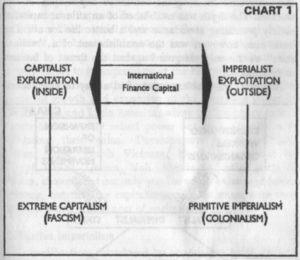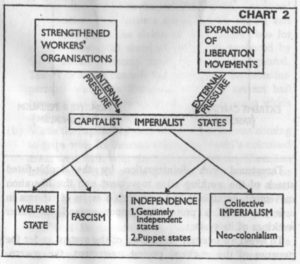Kwame Nkrumah, Handbook of Revolutionary Warfare.
“THE WORLD STRATEGY OF IMPERIALISM
Know the enemy
A number of external factors affect the African situation, and if our liberation struggle is to be placed in correct perspective and we are to KNOW THE ENEMY, the impact of these factors must be fully grasped. First among them is imperialism, for it is mainly against exploitation and poverty that our peoples revolt. It is therefore of paramount importance to set out the strategy of imperialism in clear terms:
- The means used by the enemy to ensure the continued economic exploitation of our territories.
- The nature of the attempts made to destroy the liberation movement.
Once the components of the enemy’s strategy are determined, we will be in a position to outline the correct strategy for our struggle in terms of our actual situation and in accordance with our objectives.
Before the Second World War, the world (excluding the USSR, China, etc.) was divided into:
- Capitalist states practicing orthodox imperialism under the generally known form of imperialism
- Colonial territories which fed the economies of the capitalist imperialist states. (The Latin American territories had already passed from the status of ‘Spanish’ and ‘Portugese’ colonies to that of neo-colonies).
However, after the Second World War, serious economic, social and political tensions arose in both spheres.
- Inside the capitalist-imperialist states, workers’ organizations had become comparatively strong and experienced, and the claims of the working class for a more substantial share of the wealth produced by the capitalist economy could no longer be ignored. The necessity to concede had become all the more imperative since the European capitalist system had been seriously shaken up by the near-holocaust which marked the experience of imperialist wars.
- While the capitalist system of exploitation was coming to grips with its internal crises, the world’s colonized areas were astir with the upsurge of strong liberation movements. Here again, demands could no longer be cast aside or ignored especially when they were channelled through irresistible mass movements, like the Rassemblement Démocratique Africain (RDA), the Parti Démocratique de Guineé (PDG) and the Convention Peoples’ Party (CPP) in Ghana. In certain areas, for example in Vietnam, Keny and Algeria, direct confrontation demonstrated the readiness of oppressed peoples to implement their claims with blood and fire.
Both in the colonial territories and in the metropolitan states, the struggle was being waged against the same enemy; international finance capital under its external and internal forms of exploitation, imperialism and capitalism.

Threatened with disintegration by the double-fisted attack of the working class movement and the liberation movement, capitalism had to launch a series of reforms in order to build a protective armour around the inner workings of its system.
To avoid an internal breakdown of the system under the pressure of the workers’ protest movement, the governments of capitalist countries granted their workers certain concessions which did not endanger the basic nature of the capitalist system of exploitation. They gave them social security, higher wages, better working conditions, professional training facilities, and other improvements.
These reforms helped to blur fundamental contradictions, and to remove some of the more glaring injustices while at the same time ensuring the continued exploitation of the workers. The myth was established of an affluent capitalist society promising abundance and a better life for all. The basic aim, however, was the establishment of a ‘welfare state’ as the only safeguard against the threat of fascism or communism.’

However, the problem was to find a way to avoid sacrificing the all-important principle of ever-increasing profits for the owning minority, and also to find the money needed to finance the welfare state.
By way of a solution, capitalism proceeded to introduce not only internal reforms, but external reforms designed to raise the extra money needed for the establishment and the maintenance of the welfare state at home. In other words, modern capitalism had come to depend more heavily than before on the exploitation of the material and human resources of the colonial territories. On the external front, therefore, it became necessary for international finance capital to carry out reforms in order to eliminate the deadly threat to its supremacy of the liberation movement.
The urgent need for such reforms was made clear by the powerful growth and expansion of the liberation forces in Africa, Asia and Latin America, where revolutionary movements had not only seized power but were actually consolidating their gains. Developments in the USSR, China, Cuba, North Vietnam, North Korea, and in Egypt, Ghana, Guinea, Mali, Algeria and other parts of Africa, showed that not only was the world balance of forces shifting, but that the capitalist-imperialist states were confronted with a real danger of encirclement.
Collective imperialism
The modifications introduced by imperialism in its strategy were expressed:
- Through the disappearance of the numerous old-fashioned ‘colonies’ owing exclusive allegiance to a single metropolitan country.
- Through the replacement of ‘national’ imperialisms by a ‘collective’ imperialism in which the USA occupies a leading position.
The roots of this process may be traced back to the period of the Second World War, when the socialist camp was still too small and weak to give decisive assistance to the European working class movement. The workers were therefore all the more easily deflected from the objectives of their struggle, and allowed themselves to be dragged into a bloody war of imperialism.
The Second World War seriously strained the political and economic strength of Europe, although capitalism as a system emerged relatively intact. However, the true winner of the whole contest turned out to be the United States of America. Having helped the allies to win the war, the USA was from then on able to retain its pre-eminent position, and to acquire increasing influence in the economic life of the exhausted European states.
This ‘internationalisation’ or ‘syndicalisation’ enabled US imperialism to forestall temporarily an incipient crisis by fulfilling two sin qua non conditions:
- The need to expand. The US-European post-war alliance not only enabled the USA to benefit from the advantages of the European market, which had hitherto been largely closed to its penetration; but also opened up new horizons in Asia, Africa, and Latin America wehre the USA had already superceded European supremacy and established neo-colonialist domination.
- The need to militarize. The militarization of the US economy, based on the political pretext of the threatening rise of the USSR and later of the People’s Republic of China, as socialist powers, enabled the USA to postpone its internal crises, first during the ‘hot’ war (1939-1945) and then during the ‘cold’ war (since 1945).
Militarization has served two main purposes:
- It absorbed, and continues to absorb, an excess of unorganized energy into the intense armaments drive which supports imperialist aggression and many blocs and alliances formed by imperialist powers over the last twenty years.
- It made possible an extensive policy of paternalist corruption of the poor and oppressed people of the world.
The principle of mutual inter-imperialist assistance whereby American, British, French and West German monopoly capital extends joint control over the wealth of the non-liberated zones of Africa, Latin America and Asia, finds concrete expression int eh formation of interlocked international financial institutions and bodies of credit:
International Monetary Fund (IMF), USA 25% of votes.
International Bank for Reconstruction and Development (IBRD), USA 34% of votes.
International Development Association (IDA), USA 41% of the votes.
On a lesser sale, Europe as a whole, and West Germany in particular, find profitable outlets for big business in Africa through the agencies of such organizations as the European Common Market (EEC).
The imperialists even make use of the United Nations Organization in order to camouflage their neo-colonialist objectives. This can be seen, for example in US policy in South Korea and the Congo.”
1-7